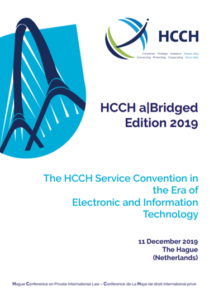Views
Nothing Found
Sorry, no posts matched your criteria
News
Online Symposium on Private International Law in Nigeria
The editors of Afronomicslaw.org have invited Dr. Chukwuma Okoli and Professor Richard Frimpong Oppong to organise a symposium on Private International Law in Nigeria. The purpose of the symposium is to discuss important issues on the subject of private international law in Nigeria with principal reference to Chukwuma and Richard’s recent pioneer work on the subject that was published under the Hart Studies in Private International Law. Drawing on over five hundred Nigerian cases, relevant statutes, and academic commentaries, the book examines the rules, principles, and doctrines in Nigerian law for resolving cases involving cross-border issues. It is the first book-length treatise devoted to the full spectrum of private international law issues in Nigeria.
Four papers have now been selected for the symposium, which will first be published in Afronomicslaw.org sometime in December this year, and later in conflictoflaws.net, where Chukwuma is an editor. The names of the persons presenting are Dr. Abubakri Yekini (Lecturer in Law at Lagos State University, Nigeria), Orji Uka (Senior Associate at African Law Practice, Nigeria), Anthony Kennedy (Associate Member of Serle Court, England), and Richard Mlambe (Lecturer in Law at University of Malawi – Polytechnic).
HCCH a|Bridged – Edition 2019: Post-Event Publication – 1965 Service Convention
 The HCCH has today launched the publication from HCCH a|Bridged – Edition 2019. This was the inaugural edition of HCCH a|Bridged, held in December 2019, the focus of which was the ‘The HCCH Service Convention in the Era of Electronic and Information Technology’. The post-event publication builds on the discussions and compiles written contributions from each of the speakers. It is available for download in English, together with videos of each of the sessions, on the dedicated page of the Service Section of the HCCH website.
The HCCH has today launched the publication from HCCH a|Bridged – Edition 2019. This was the inaugural edition of HCCH a|Bridged, held in December 2019, the focus of which was the ‘The HCCH Service Convention in the Era of Electronic and Information Technology’. The post-event publication builds on the discussions and compiles written contributions from each of the speakers. It is available for download in English, together with videos of each of the sessions, on the dedicated page of the Service Section of the HCCH website.
This post is published by the Permanent Bureau of the Hague Conference of Private International Law (HCCH).
Call for Papers Brussels II-bis Recast (NIPR)
Call for Papers: Brussels II bis Recast
The long-awaited revision of the Brussel II-bis Regulation has been finalized and the instrument enters into force on 1st August 2022. In anticipation of this event, the Dutch Journal of Private International Law (Nederlands Internationaal Privaatrecht – NIPR) wishes to invite researchers in the field of private international family law to submit abstracts for an upcoming Special devoted to the Recast. The abstract should focus on one of the following topics:
- Divorce jurisdiction
- Choice of forum clauses in parental responsibility cases
- Referral of cases within the Brussels II-bis Recast
- Child Abduction cases
- Provisional and protective measures
- Recognition and enforcement of judgments
- Coordination with other instruments
Abstracts should be no longer than 500 words and should be submitted by 15 January 2021 to nipr.redactie@asser.nl. Submissions are limited. The selection criteria will be based on the quality of the research and its originality. We also strive to ensure a diversity of represented legal systems and topics.
The accepted papers will also be invited to present their findings during a seminar to be held in cooperation with Tilburg University, the Netherlands. More information about this event will be distributed after acceptance of the abstract.


